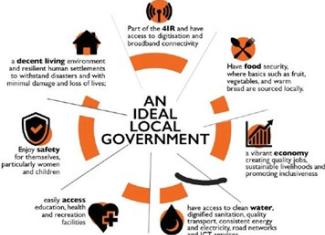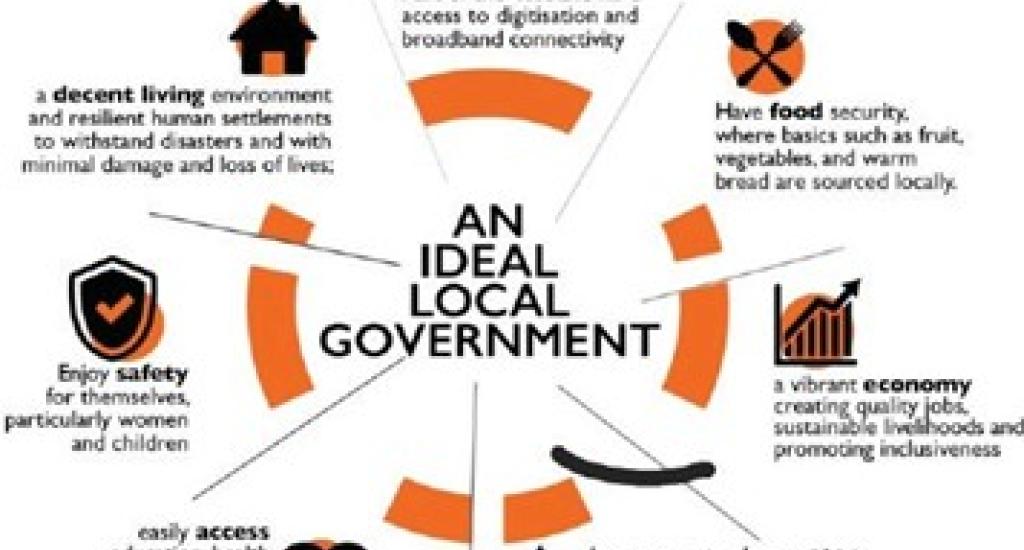Municipalities
in Gauteng building a capable, ethical and developmental local government

Municipalities are governed primarily through three pieces of legislation, the Municipal Finance Management Act, Municipal Systems Act and Municipal Structures Act. These pieces of legislation have been promulgated in 2000 except for the Municipal Structures Act that was promulgated in 1998. Developmental local government is a vision for the future form of local government in South Africa. The National Development Plan envisages that by 2030, South Africa will be a state that is capable of playing a developmental role.
The developmental role mandated to municipalities is indicative of the fact that municipalities are no longer confined to the provision of basic services only, but local economic development and human resource development is also central to the realisation of developmental local government. Developmental local government must play a central role in representing our communities, protecting our human rights and meeting our basic needs. It must focus its efforts and resources on improving the quality of life of our communities, especially those members and groups within communities that are marginalised, such as women, persons with disabilities and poor people who are unable to pay for services.
Since 1994, South Africa has embarked on an ambitious project of state formation and building; not least in the local government sphere. In 1998, government published the White Paper on Local Government and introduced a series of laws, policies and support programmes to direct the establishment of local government as a distinctive, interrelated and interdependent sphere of government. Great strides were made in establishing municipal systems and processes, as well as in strengthening and building institutional capability including public participation processes.
Becoming a developmental state
The 1994 democratic elections, the promulgation of the Constitution of the Republic of South Africa, 1996, the White Paper on Local Government and the introduction of the Reconstruction and Development Programme in 1994 were watershed moments in South African history. These propelled South Africa towards becoming a developmental state and set the country on a trajectory designed to overcome the socio-economic dimensions that disadvantaged the poor. However, poverty, unemployment and inequality still remain rampant in South African society, a quarter of a century on. Developmental local government will be possible only if private business, municipalities, communities and civil society organisations are all committed to the transformative agenda put forward by the Constitution, the White Paper on Local Government and the Municipal Systems Act of 2000.
Former Co-operative Governance and Traditional Affairs Minister Thembi Nkadimeng said in order to achieve good governance, there is a need to define a clear line between political and administrative roles through proper systems and policy development. In the Fifth Administration, former Premier David Makhura indicated that service delivery at both provincial and local levels will be a distinguishing feature of his administration, introducing the Ntirhisano programme, where departments will work with communities to restore trust in government and deliver services.
The state of local government finances, delivering of services and payment for services has been under scrutiny for the last decade and whilst many governance and policy reforms have been introduced to curb spending, the National Treasury outlined that the state of local government finances remain a significant risk to service delivery and the fiscus at large. The servicing and reduction of debt service costs, reduction of wastage in the form of wasteful, fruitless and irregular expenditure should be at the forefront of governance innovation.
The quality of life index (QoL) 2020/21 signifies that despite various forms of support, results from the survey show that the Covid-19 pandemic has taken a toll on people s physical and psychological wellbeing. Self-reported health, overall satisfaction with life, and mental health have all worsened relative to 2017/18. The outcomes of the survey shows a decline in the levels of service delivery and the level of satisfaction with local government. The QoL Index score for 2020/21 is notably lower than in 2017/18, falling from 64 to 61.
The State of Local Government Report finalised in 2023 demonstrated the inability of municipalities in Gauteng to control their water and electricity losses, which has an adverse effect on their sustainability and financial viability. Water losses in most municipalities exceed the permitted ranges for water losses (15% to 30%). The factors cited by municipalities as contributing to losses are failure to implement water loss reduction plans, old infrastructure, unmetered areas, water leaks and pipe bursts, and improper billing. Poor infrastructure maintenance, bypassing of meters through illegal connections, poor state of infrastructure, poor billing systems, theft of generators from power stations, and electricity cable thefts con- tributed to increased water and electricity losses.
State of the municipalities
The outcome of the local government elections in 2021 saw the emergence of coalition governments with 10 out of 11 municipalities being hung councils, without an outright majority, with the exception of Midvaal Local Municipality. Service delivery assumed centre stage in South Africa, due to highly publicised wide-spread protests within communities. This increased pressure on municipalities to deliver on their mandates and to ensure effective service delivery. Generally, local municipalities responded to majority of water and sanitation, roads, stormwater and roads maintenance service delivery requests within 48hours.
The level of achievement range between 64% and 92%, while the metropolitan municipalities performance was recorded below 50% on response to water callouts but improved response times in other areas. The majority of complaints were as a result of poor maintenance that could have been avoided.
As of October 2023, out of 115 positions for municipal senior managers, 75 positions were filled, and 40 positions vacant. City of Tshwane, Sedibeng District Municipality, Emfuleni Local Municipality, Midvaal Local Municipality and Merafong City Local Municipality, currently have the highest vacancy rates at senior management level. The overall vacancy rate at municipal senior management level is 34%. The high vacancy rates affect institutional stability and general service delivery.
To realise a democratic developmental state in South Africa, democratic developmental local government should not be compromised at local government level and appointed and elected officials should be trained to understand the importance of developmentalism in praxis. A fundamental developmental initiative is the removal of political deployees for administrative and technical appointments so that there is clear separation between the political representatives and officials in a municipality.




